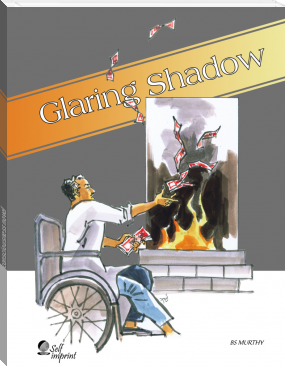Jewel-less Crown: Saga of Life - BS Murthy (polar express read aloud txt) 📗

- Author: BS Murthy
Book online «Jewel-less Crown: Saga of Life - BS Murthy (polar express read aloud txt) 📗». Author BS Murthy
“What’s the right mix then of kama and artha,” said Gautam, “for a moksha-enabling-dharma?”
“Dharma is not some physical compound that lends itself for the chemical formulation,” said the seer smilingly. “Why don’t you realize that we are dealing with the complexities of life? When it comes to the basics of living, even the wretched of the earth have their way. The handouts of charity would ensure their survival and the ratio of the sexes provides them their fair share of sex. Then, won’t the ‘eat and procreate’ regimen amount to an animal life in the human form? What are the human faculties for, if not for the enrichment of the quality of life? Thus, the evolution of dharma is seeded in the application of the mind. While the characteristics of our genes define the scope of our kama, the circumstances of birth shape our spheres of artha.”
“So swamiji,” said Gautam, “it all amounts to man cutting the coat of dharma according to the cloth of his life, isn’t it?”
“Won’t that amount to defeatism?” said the seer. “While giving up on hope is despair, not striving for betterment is self-denial. The dynamics of living lay in the limitations birth imposes and the possibilities the circumstances of life entails. Thus, lamenting over the limitations of birth and missing on the opportunities of life would only lead one to a state of frustration. And frustration paralyses the self and punctures the buoy of joy. What is worse, it breeds tendencies that are inimical to the social good. On the contrary, the precept of dharma is about trying to limit the limitations of birth and further the possibilities of life, all the while enjoying that engagement. This philosophy of living enriches the self and uplifts the soul, leading to a life of harmony, regardless of the restrictions one's environment imposes.”
“What stunts one's dharmic path swamiji?”
“It is artha, the alter ego,” said the seer. “Is it not the propensity of man to compare himself in arthic terms with others for his self-worthiness or otherwise? That is since the social niceties preclude one from making kama the measure of him or her? Well, culture would have us confine the nuances of romance to the precincts of the bedrooms. Leave aside kama, can there be a hallmark of comparison, of attributes of the creation, unique to the individuals. That’s how artha came to dominate the human domain as a common denominator for universal comparison.”
“How disastrous that is proving to our life swamiji?”
“Well, with artha having become the visible measure of human worth,” continued the swamiji with a sense of sadness, “man began to exert himself at acquiring wealth. It’s as if he doesn’t want to lose in comparison! If anything, the opportunities of our times opened the doors to all comers. So, the wayward crowd swelled up to trample upon the values of life leading to a cultural chaos of material acquisitions. It is as if the talent in all other spheres of human endeavor ceased to count. In this mad rush for moolah people fail to realize that it requires a great strength of character to give up what’s not one's due than to accumulate through questionable means.”
“Swamiji, do you mean materialism is a poison?”
“On the contrary,” said the seer as his face lighted up, “it turned out to be the narcotic of the downtrodden. Never in the annals of mankind did the meek have as good as in our materialistic times. Lacking in intellect and devoid of wealth, the multitude of humanity existed subhuman all along. Mercifully now, materialism enables them access to the goodies of life to fill up their alter egos. In that way, the majority of the populace has hit the highway of betterment.”
“Swamiji, it’s a new perception really!”
“But, the intellectual and the talented that are capable of experiencing the richness of life without wealth have come to naught,” the seer said, pained at that thought. “With their hurt egos at being slighted by the material minded, they tend to join the arthic bandwagon. The fall of these is the bane of today’s world. What is worse, their arthic greed has come to goad them to abuse their positions for self-aggrandizement. The corrupt tune they set for the materialistic culture became the hymn of humanity. It’s the tragedy of our times that the endowed get condemned in the new order.”
“What’s the dharma for their moksha swamiji?”
“What with the advancement of science and the availability of knowledge,” said the swamiji, “they are in a vantage position to shape their dharma to journey their lives in the carriage of cushions. But unfortunately most let jealousy hurt their joy ride. And that hurts their sense of bliss.”
“Can one ever overcome jealousy,” said Gautam, “when it’s man’s second nature?”
“On the contrary, I see jealousy as something alien to human nature,” said the swamiji to Gautam’s utter surprise. “Jealousy is but a manifestation of artha’s corruptive influence on man which in due course became the insurmountable hurdle for him on the path of moksha. It is in man’s power to curtail it to manage his passage to moksha. One needs only to understand the physics of jealousy to appreciate the chemistry of its affects on human nature.”
“Swamiji, with due regards to your profound wisdom,” said Gautam, “artha might be the abettor of jealousy but how could it be its source?”
“It is so simple dear,” said the seer with all affection. “Isn’t our persona fundamental to our identity? Don’t we come to accept the way we look? A Narcissus amongst us might even end up being in love with the way he was made. Would her handsome cousin give the plain lass any sleepless nights on that score? Won’t thus our self-love shield us from the perils of jealousy when it comes to how we are shaped? Why is that the neighbor’s delectable spouse is not so much a source of envy as it is an object of desire? Does that not prove that jealousy is not inherent to human nature?”
“Oh, swamiji,” said Gautam in excitement, “I’m seeing my past in a new prism now.”
“But, when it comes to things material, man is found wanting in maintaining his equanimity,” continued the seer. “Lacking in comparison, materialistically that is, man turns obsessive to better his lot or burns in jealousy, either way, upsetting the tranquility of his life! Is it not man’s stupidity that makes him a victim of jealousy? If only man could detour the mirages of jealousy in the sands of materialism, he could lay his own path of dharma that takes him to the oasis of moksha. And the karmic theory—to each one accordingly to his deeds in the previous birth—could come in handy for man to avoid the mishap of unhappiness.”
“But swamiji, won’t such a philosophy of contentment block mankind’s progress?”
“Well, the karmic theory has a unique bipolarity about it,” said the swamiji. “While imploring upon man to reconcile to his situation in life it exhorts him to excel at the station of his life for a better one in his rebirth. Thus, the karmic approach to life enables man to remain mentally tranquil even as he climbs up the material heights within his reach.”
“But swamiji,” said Gautam, “all that is fine for an unmarried, but, won’t the dynamics of marriage tend to upset the apple-cart of life?”
“A spouse could be an enlightened aide or a troublesome companion on the moksha-enabling path of life,” said the seer. “The dharma of compromise hauls the coupe of matrimony on the parallel track of contrasts. Well, marriage is all about striking a balance between the dreams of the spouses and the realities of their lives. Sans this balance, the carriage of marriage is destined for derailment on the parallel tracks of artha and kama. But, route deviations notwithstanding, compromises maneuver marriages on the course of moksha. In your case, but for your arthic overdrive, the dharmic course of your marital union would have taken the karmic turn towards moksha.”
“Oh swamiji,” said Gautam prostrating before the seer, “how your words give me solace!”
“That would help you serve your cause,” blessed the swamiji.
“I need your blessings.”
“Is it barter?” the swamiji asked mysteriously.
“Oh, no, swamiji,” said a grateful Gautam, “let Suresh keep it all, save for the nityaannadaanam at Vanaprastham.”
“God bless you.”
Guided by the seer, Gautam could put his past behind to be at peace with himself. Moreover, before setting out to Vanaprastham, vowing never to return to Delhi, he had entrusted his assets with trusted men in New Delhi for their proper upkeep.
Episode 2
Collage of Crime
Lodged at the Tihar as a lifer, Suresh had realized that the reprieve he got would come to naught if he were to carry the baggage of guilt well into his life. Thus, he resolved to put the sins of his past and the psyche of the noose behind him. But, he never forgot Sneha’s last wish that he should make a difference to himself and to the society around him. Having owed his life to her death, he felt he owed it to her to fulfill her wish. As he understood the enormity of her sacrifice, he realized the significance of his future to her memory. And so he vowed to make the fulfillment of her wish the goal of his life.
So, he tried to focus on a fruitful future to imbibe a positive psyche while still in gaol and in the process he began daydreaming to turn into a Good Samaritan. But, as he realized the limitations of his intellect to fit in that role, he turned to Rakesh Tiwari, the jail warden, for advice. Impressed with Suresh’s ardor to serve society, the warder thought it fit to put him into the world of the fiction. Tiwari told Suresh that nothing like a novel exposes man to the nuances of life through the thought process of its protagonists. The warder believed novels form the foundation for the understanding of life and thus are the best self-help books there were ever.
As Suresh was always found with a book in hand, his mates named him a bookworm. As he graduated with the novel in time, the warder introduced him to psychology in turn. And that helped Suresh no end to gain an insight into human nature, which improved his perceptivity of life itself. Confounded by the complexity of the theories he read, he was compelled to contemplate about the profoundness of the same. But, as his perception grew, so was his urge for knowing more. Soon he began to familiarize himself with history and found himself seeing the reflections of the same in the fiction itself.
The offshoot of these intellectual pursuits was the empathy he came to develop for the unfortunate. As his mother’s last wish ever remained fresh in his mind, this new-found understanding of human nature made him take an interest in the affairs of the prisoners. As his capacity to grasp the complexities of life improved thus, he began to collage the crimes that brought people to Tihar.
The first to befriend Suresh were the brothers, Sunil and Deepak. In the same age group as his, they were hauled up for having murdered their father and the stepbrother, besides raping and killing their stepmother. It all started with their father’s affair with his younger brother’s wife.





Comments (0)